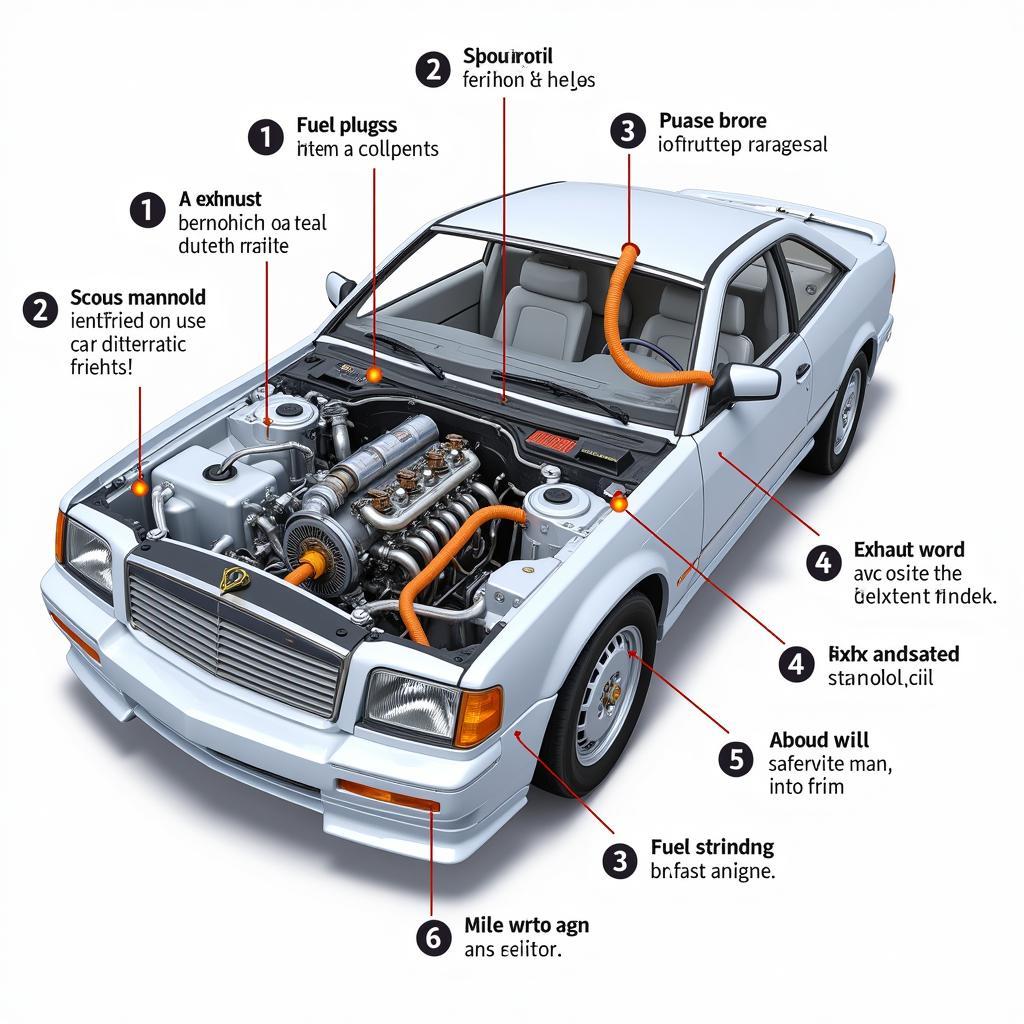Dealing with an exhaust smell in your car? This unwelcome odor can indicate a serious problem, impacting both your health and your vehicle’s performance. Don’t ignore it! This guide covers everything you need to know about How To Fix Exhaust Smell In Car, from simple DIY checks to more complex repairs.
Why Does My Car Smell Like Exhaust?
An exhaust smell inside your car is never normal. It indicates that exhaust fumes, containing harmful gases like carbon monoxide, are leaking into the cabin. This could be due to a number of reasons, ranging from a simple loose connection to a more serious issue with the exhaust system itself. Pinpointing the source of the leak is crucial for effective repair. Soon after getting the car inspected, make sure to check your oil level too. If you need to learn how to fix overfilled oil in car, it’s always good to be proactive.
Common Causes of Exhaust Smell in Car
Exhaust Manifold Leaks
One of the most common culprits is a cracked or warped exhaust manifold. This component connects the engine to the exhaust system, and due to its location close to the engine, leaks here can easily enter the cabin.
Exhaust Pipe and Muffler Issues
Holes or rust in the exhaust pipes and muffler are another frequent cause. These components are exposed to the elements, making them susceptible to corrosion and damage.
Faulty Catalytic Converter
A failing catalytic converter can also cause an exhaust smell. The catalytic converter is responsible for converting harmful gases into less harmful ones, and a malfunction can lead to increased exhaust fumes.
Worn-Out Exhaust Gaskets
Exhaust gaskets seal the connections between various parts of the exhaust system. Over time, these gaskets can wear out, allowing exhaust fumes to escape.
Cracked or Damaged Tail Pipe
The tail pipe is the final section of the exhaust system. Damage to this part, such as cracks or holes, can also allow exhaust fumes to enter the vehicle.
How to Fix Exhaust Smell in Car: A Step-by-Step Guide
- Inspect the Exhaust System: Carefully examine the entire exhaust system, from the manifold to the tail pipe, looking for any visible signs of damage, rust, or leaks.
- Check for Loose Connections: Make sure all connections are tight and secure. Loose clamps or bolts can allow exhaust fumes to escape.
- Use a Smoke Machine: A smoke machine can help pinpoint even the smallest leaks. This device pumps smoke into the exhaust system, making it easy to see where fumes are escaping.
- Repair or Replace Damaged Components: Depending on the source of the leak, you may need to repair or replace specific components such as the manifold, exhaust pipes, muffler, catalytic converter, or gaskets.
- Check for Blockages: Sometimes, a blockage in the exhaust system can cause increased pressure and lead to leaks. Make sure the system is clear of any obstructions.
Expert Advice
“A small exhaust leak may seem minor, but it can pose a serious health risk due to carbon monoxide exposure,” says Dr. Robert Miller, an automotive engineer. “Addressing the issue promptly is essential for your safety and the well-being of your passengers.”
If you’re also noticing steam coming from your car, it’s worth checking out this article: fix steam coming out of car. Steam can indicate different issues that require a separate fix. And if you have a cracked radiator, here’s a guide on how to fix a cracked car radiator.
When to Seek Professional Help
While some exhaust repairs can be done at home, complex issues often require professional expertise. If you’re unsure about the source of the leak or uncomfortable working on the exhaust system yourself, it’s best to take your car to a qualified mechanic. Sometimes a coolant leak can also mask the smell of exhaust. It’s important to be able to distinguish between the two. Check out this article on how to fix leaking coolant in car to ensure you’re addressing the correct problem.
Conclusion
Addressing an exhaust smell in your car is a priority for your safety and the longevity of your vehicle. By understanding the potential causes and following the steps outlined in this guide, you can effectively how to fix exhaust smell in car and prevent further issues. Don’t hesitate to reach out to AutoTipPro for assistance at +1 (641) 206-8880. Our office is located at 500 N St Mary’s St, San Antonio, TX 78205, United States. We’re here to help!
FAQ:
- What are the health risks associated with exhaust fumes in a car? Carbon monoxide poisoning is the primary concern, leading to headaches, dizziness, nausea, and even death in severe cases.
- Can I drive my car with an exhaust leak? It’s not recommended, as it poses a safety risk.
- How much does it typically cost to fix an exhaust leak? The cost varies depending on the severity and location of the leak.
- How often should I inspect my exhaust system? A visual inspection should be done regularly, and a more thorough check is recommended at least once a year.
- Can I use sealant to fix an exhaust leak temporarily? Exhaust sealant can be a temporary solution for small leaks but is not a permanent fix.
- What are the signs of a faulty catalytic converter? Symptoms can include a decrease in fuel efficiency, a rotten egg smell, and a check engine light.
- How can I prevent exhaust leaks in the future? Regular maintenance, including inspections and prompt repairs, is key to preventing future leaks.





Leave a Reply